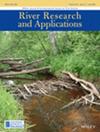评估水文系统变化的新型联合概率密度差分法
IF 1.9
4区 环境科学与生态学
Q4 ENVIRONMENTAL SCIENCES
引用次数: 0
摘要
上游水库的建设和运行极大地改变了下游的水文系统。对水文状态的改变采用适当的、可量化的评估方法,对于生态保护和恢复至关重要,也是新出现的方法。变率范围法 (RVA) 和修正的 RVA 方法已被广泛用于评估水文变化。然而,这些方法未能同时详细描述指标和形态特征的分布,难免会导致对变化的误判。本文提出了一种联合概率密度差分法(JPDDA),通过引入高斯核密度估计(KDE)和 copula 函数来解决以往方法的主要缺陷。选择年平均流量作为参考变量,以构建其自身与其他水文变化指标之间适当的联合概率密度函数。JPDDA 方法可通过高斯 KDE 对边际分布进行详细描述,还可将形态特征与 copula 函数联系起来。结合前人的方法,根据 1949 年至 2022 年的实测流量估算了长江宜昌水文站的水文变化。结果表明,在上游大型梯级水库的影响下,水文情势发生了中度甚至严重的变化,而 JPDDA 在实际评估的合理性和稳定性方面优于其他方法。因此,建议采用 JPDDA 方法处理水文变化,并为生态运行提供合理的参考。本文章由计算机程序翻译,如有差异,请以英文原文为准。
A novel Joint Probability Density Difference Approach for assessing the alteration of hydrologic regime
The construction and operation of upstream reservoirs have significantly altered downstream hydrologic regime. Appropriate and quantifiable assessment method for the alteration of hydrologic regime is considerably vital and emergent for ecological protection and restoration. The Range of Variability Approach (RVA) and modified RVA methods have been widely used in practice to assess the hydrological alteration. However, these methods have failed to concurrently describe the distribution of indicator and morphological features in detail, which might inevitably lead to the misjudgment of alteration. This paper proposes a Joint Probability Density Difference Approach (JPDDA) method to address the major drawbacks of these previous methods with the introduction of Gaussian Kernel Density Estimation (KDE) and copula function. The annual average flow is selected as the reference variable to construct a proper joint probability density function between itself and other hydrological alteration indicators. The JPDDA method could describe the marginal distribution in detail through Gaussian KDE and also link the morphological features with copula function. Along with pervious methods, the hydrological alterations at Yichang hydrological station, Yangtze River are estimated based on the measured flow from 1949 to 2022. It is shown that the hydrologic regime has suffered from a moderate or even heavy alteration under the influence of massive upstream cascade reservoirs, and the JPDDA outperforms the other methods in terms of rationality and stability for practical assessments. Thus, the proposed JPDDA method is strongly advised to handle the hydrological alteration and could provide a reasonable reference for ecological operation.
求助全文
通过发布文献求助,成功后即可免费获取论文全文。
去求助
来源期刊

River Research and Applications
环境科学-环境科学
CiteScore
4.60
自引率
9.10%
发文量
158
审稿时长
6 months
期刊介绍:
River Research and Applications , previously published as Regulated Rivers: Research and Management (1987-2001), is an international journal dedicated to the promotion of basic and applied scientific research on rivers. The journal publishes original scientific and technical papers on biological, ecological, geomorphological, hydrological, engineering and geographical aspects related to rivers in both the developed and developing world. Papers showing how basic studies and new science can be of use in applied problems associated with river management, regulation and restoration are encouraged as is interdisciplinary research concerned directly or indirectly with river management problems.
 求助内容:
求助内容: 应助结果提醒方式:
应助结果提醒方式:


